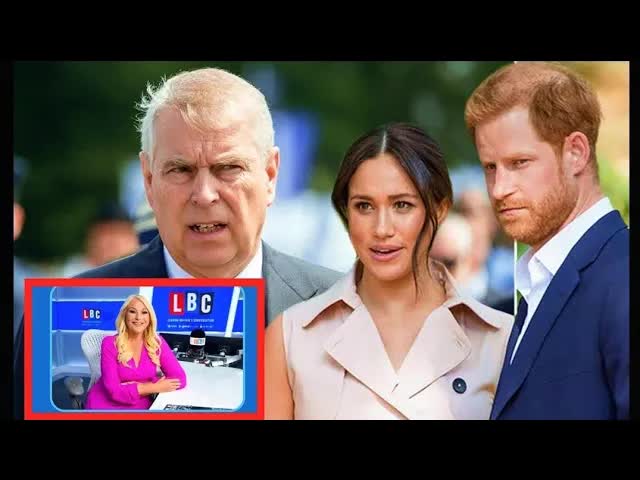In a world where royal scandals seem to follow the British monarchy like a shadow, Prince Andrew continues to find himself at the center of controversy, raising eyebrows and questions about his judgment.
Despite being born into privilege and surrounded by advisors, Andrew’s choices have repeatedly drawn criticism.
It’s baffling to think that someone with such a background could be so easily led astray, yet here we are.
Listeners of Vanessa Feltz’s show have voiced their frustrations, highlighting a glaring hypocrisy in how the public perceives different members of the royal family.
For instance, Nicky from Kent pointed out the stark contrast between the intense scrutiny faced by Prince Harry and Meghan Markle compared to the almost deafening silence surrounding Prince Andrew’s misdeeds.
Why is it that Andrew, often labeled as an arrogant freeloader, seems to evade the same level of outrage?
Sarah, another caller, emphasized that the royal family sets an example for the nation and should be held accountable for their actions.
She argued that Andrew’s connections—most notably with a Chinese spy—pose a serious risk to the country and should not be overlooked.
The sentiment resonates with many who believe that the royal family ought to uphold a standard of behavior that reflects positively on the United Kingdom.
The notion of supporting Andrew because he’s “ill-advised” by palace officials or government ministers raises eyebrows.
After all, this isn’t just about bad advice; it’s about a pattern of behavior that has led to significant embarrassment for the royal family.
History shows us that members like Princess Margaret and even Harry have faced their own share of scandals, but why does Andrew seem to get a free pass?
As the conversation unfolds, it becomes clear that there’s a troubling double standard at play.
While Andrew’s reputation remains largely intact despite serious allegations, Harry and Meghan are subjected to relentless criticism.
This disparity begs the question: why are some royals treated with kid gloves while others are dragged through the mud?
The media plays a crucial role in shaping public perception, and the selective focus on certain royals reveals underlying biases.
The British press has been quick to vilify Harry and Meghan for their choices, from their Netflix documentary to their candid interviews, yet Andrew’s connections to Jeffrey Epstein are often brushed aside.
It’s as if the media has adopted a policy of institutional amnesia when it comes to Andrew’s scandals.
This selective treatment raises important questions about the motivations behind the media’s relentless focus.
Are they protecting the institution of the monarchy at the expense of transparency and accountability?
The royal family’s carefully curated image seems to take precedence over addressing uncomfortable truths, leaving the public questioning the integrity of the entire institution.
Interestingly, this isn’t the first time the royals have faced scrutiny over their inconsistent judgments.
Historical context shows that the royal family has a long history of applying standards unevenly.
While Harry’s alleged indiscretions are met with fierce criticism, Andrew’s far more serious allegations seem to disappear from public discourse.
The ongoing debate around Andrew’s behavior and the public’s reaction underscores the divide between those clinging to outdated notions of royal infallibility and those demanding accountability.
It’s a divide that highlights a broader issue within society: the expectation that some individuals, particularly those of royal lineage, should be above reproach.
Perhaps the most troubling aspect of this situation is the attempt to defend Prince Andrew, as seen in a recent exchange on Feltz’s show.
A caller named Stephen tried to argue for Andrew’s support, seemingly oblivious to the gravity of the allegations against him.
Such attempts to rehabilitate Andrew’s image only serve to frustrate those who seek genuine accountability from public figures.
The stark contrast in media treatment of Andrew compared to Harry and Meghan reveals a grotesque selectivity in how royal scandals are perceived.
While Harry speaks his truth and shares his experiences, Andrew’s documented misconduct is often ignored.
This inconsistency not only highlights biases within royal reporting but also raises significant questions about fairness and justice in the treatment of all royal family members.
As the royal narrative continues to evolve, it becomes increasingly evident that the monarchy must confront its internal dynamics.
The apparent willingness to protect certain individuals while marginalizing others speaks volumes about the priorities within the royal family.
Ultimately, the public deserves transparency, and the royal family must navigate the fine line between maintaining their image and upholding true accountability.
